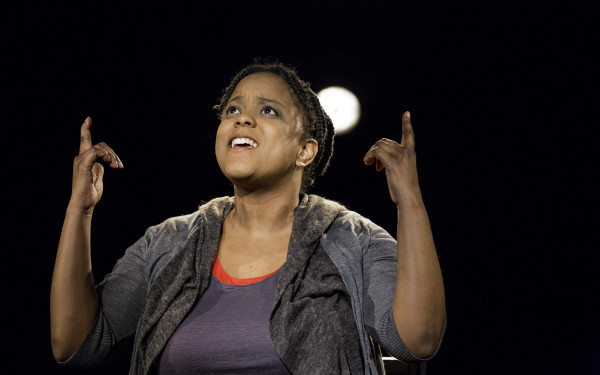Uncovering the Story of Marie Joseph Angélique
Black Theatre Workshop and Table D’Hôte Theatre Premiere Angélique
“What are the circumstances that make people do monstrous things?” asked director Mike Payette.
Payette is at the helm of Angélique, the most recent show co-produced by Black Theatre Workshop and Table D’Hôte Theatre. Playwright Lorena Gale’s piece tells the story of Marie Joseph Angélique, a Black slave in Montreal in the 18th century.
Angélique was accused of setting a fire that burnt down much of what is now known as Montreal’s Old Port. Her punishment? Public torture and execution in 1734. With little to no evidence, she was accused over rumour and for her reputation of being an outspoken and “troublesome” slave. The play is presented in a docu-drama style and uses historical transcripts and events to stage Angélique’s story accurately and honestly.
Black Theatre Workshop and Table D’Hote Theatre focused on expressing the injustice in Angelique’s life and death.
“What gives a state the right to think that certain people can be property and what gives the state the right to execute a Black person without evidence?” demands Mathieu Murphy-Perron, the Table D’Hôte’s artistic producer.
Perron was shocked when Payette—then artistic director of Table D’Hôte—first showed him the script for Angélique and explained that it had never been produced in Montreal, despite being more than 15 years old.
After more than two years of work with countless collaborators across different art forms, the piece about an event deeply entrenched in Montreal’s racial history is now set to open in Montreal for the first time.
Payette described the process of working on such an important play as “golden.” Perron was all smiles while going over how Angélique would demonstrate the magic that theatre can create when it is properly funded.
Payette lauded the script for not only telling a story that is known by far too few, but also for how Gale managed to explore such powerful questions in her work.
“The script meshes with fact but also broadens it to a more universal or humanitarian question of what is the relationship of those who have power and those who don’t—and why is there a cyclical systemic oppression of Black people and the other […] What is our obsession with our need to put down those who are different?” Payette said.
Black Theatre Workshop director Quincy Armorer is similarly proud of producing a piece that deals with such universality, stressing the timelessness and significance of the play’s themes.
“It’s still so very relevant. I equate it to the Black Lives Matter movement,” said Armorer.
“For me it’s nothing new—it’s just a matter of it having evolved. The stories of Marie Joseph Angélique, Harriet Tubman, Vwiola Desmond and so many other people—those were [the people of] the Black Lives Matter movement of those times.”
To Armorer, it’s not just about presenting an important story from the past but contextualizing the problems that are just as present today.
“I think by telling this story, we’re not just looking at history as history—we’re looking at history as a reflection of things that are happening currently. We’re not over systemic racism; we’re still living in it.”
“We’re not over systemic racism; we’re still living in it.” — Quincy Armorer, Black Theatre Workshop Director
Armorer and the artists working around him are hoping that Angélique will help Canadians understand this country’s past when it comes to slavery and racism.
Canada’s history is often spoken of with an air of moral superiority when it comes to race. Many compare Canada and the United States and act as if only one of the two allowed slaves to be owned as property. But slavery was extremely prevalent in Canada as well—Canada wasn’t just a safe haven for runaway slaves from down South.
As Payette said, this country’s history with slavery was no less “insidious” because it was quieter than that of the United States.
“We have difficulty accepting that we are just as culpable as our neighbours to the south,” said Payette, adding his appreciation for Gale’s play that shows that “then is now and now is then” when it comes to the systemic, racial discrimination against Black people in Canada.
Both he, Armorer and Perron are frustrated that Canada is not always particularly willing to examine the darker parts of its own history and what it had to overcome.
The chance to tell this story and let the work speak for itself excites Payette, but he also understands the responsibility that comes with it.
“I’m exhausted by having to prove or put forward the evidence of our history of slavery,” he explained. “Theatre is that vehicle, that vessel to call out, to expose these kinds of stories. If we can’t do that with theatre then we shouldn’t be doing theatre at all.”
Angélique // Segal Centre for Performing Arts (5170 Côte-Sainte-Catherine Rd.) // March 16 to April 2 // 8 p.m. // $19.00 General

_900_558_90.jpg)


_600_375_90_s_c1.jpg)
_600_375_90_s_c1.jpg)
